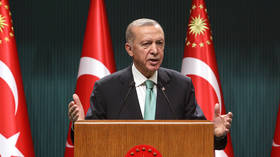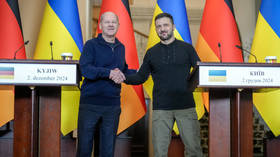Taiwan is cynically claiming China can ‘paralyze’ it in order to attract Western support
By overstating China’s military readiness to launch an attack on Taiwan – and downplaying its own ability to withstand it – the opportunistic Taipei government is trying hard to attract more backing from the US and its allies.
Taiwan’s parliament has just delivered its annual report on the capability of China’s military to launch an attack on the island.
The document was leaked to Reuters and appears to mark a significant U-turn from 2020. Last year, it said China didn’t have the ability to launch a full-scale assault on the island, but now it claims Beijing is capable of utilizing “soft and hard electronic attacks” through various means in order to disable its infrastructure, communications and all of its defences. This, it is reported, would “paralyze” the country.
The comments are also unusual because they directly contradict what was said when the Global Times sought to aggressively highlight America’s weakness in the fallout of Afghanistan, claiming that it couldn’t adequately defend Taiwan. This prompted Foreign Minister Joseph Wu to vow that the island would defend itself “to the very last day” in the event of an attack by China.
And so we are left with a puzzling scenario: Оn one hand, Taipei claims China can’t take it down without a huge effort; on the other, it’s now saying China can effortlessly overwhelm its defences.
That – and the fact the report was presented to the press – is why you might want to take its contents with a pinch of salt. The truth is that China hasn’t significantly increased its capabilities to a game-changing extent in just a year, and there is no legitimate reason why any state would deliberately broadcast its own military weaknesses to the world. There is a broader and much more subtle political purpose behind this report.
Whilst quite obviously the balance of military power between Taiwan and mainland China is lopsided in favour of the latter, what Taipei is doing here is deliberately downplaying its own prospects in order to induce fear and draw in support from other countries – especially the United States and its allies – by depicting a Chinese military takeover as an easy reality.
Also on rt.com Taiwan reports zero new locally transmitted Covid cases for first time in over three monthsThis tactic will have added impact in the midst of the Afghanistan crisis. It is, quite simply, a political stunt – as opposed to a realistic military estimation as to what would necessarily happen in a conflict – that aims to opportunistically stoke Western fears. And it is deliberately timed, too, to coincide with the release of a report on European Union relations with Taiwan.
This continues the wider pattern of Taiwan’s diplomatic and international messaging. Under President Tsai Ing-wen and the Democratic Progressive Party, Taiwan’s strategy has been to break out of the diplomatic isolation imposed by China by courting the West as frequently and aggressively as possible. And regardless of where you stand on the debate, you can’t say this policy hasn’t yielded results.
It has largely been an initiative from the grassroots up, and has included a powerful emphasis on social media given that formal channels have been limited, courting of the Western media – who are instinctively biased in its favour – the “Taiwan Can Help” public relations campaign highlighting its success in handling the pandemic and lobbying through informal channels to Western countries to improve relations.
As relations with China have soured, the US has increased its support for the island as a strategic lynchpin, as have Japan and some European nations, in particular Lithuania. This has led Beijing to accuse Taipei and its enablers of employing a ‘salami-slicing strategy’ in a bid to erode the one-China policy, but apart from the threat of force as a deterrent and economic incentives, it hasn’t been able to put together a compelling argument or narrative to push back on this. China’s lack of soft power, and Taiwan’s ideological advantage, is making the situation difficult for Beijing.
Also on rt.com China wants to ‘emulate Taliban’, Taiwan claims, vowing to defend itself from BeijingIn pursuing this PR strategy, it is inevitable that Taiwan would deliberately play down its own military capabilities to court further Western military support, and to hype up the mantra that China is a threat. Of course, geography and sheer size mean it’s not being completely unrealistic, and given China’s recent use of military planes and conducting of exercises in its vicinity, there is some evidence to say there is a threat. But the opportunistic messaging is really tactful marketing.
In a genuine military standoff, no country deliberately publicizes its own weaknesses in such a way that would encourage or incentivize an attack from another, unless it was a deliberate act of deception. This is not how military communications work, where the emphasis is on maintaining confidence and morale. After all, even as the Afghanistan government was collapsing, it never once admitted to being overrun by the Taliban.
In Taiwan’s case, the new report does not give an accurate, honest account of the country’s situation, but deliberately paints itself as a victim in order to draw in more Western support. Taipei recognizes that its own survival will not depend solely on its own actions, but also from increased backing by others, and so this is its only strategy. The real battle between Beijing and Taipei is not so much armed conflict, but a war of words, as Tsai aims to worm the island out of isolation gradually and Beijing aims to tighten the diplomatic vice.
Like this story? Share it with a friend!
The statements, views and opinions expressed in this column are solely those of the author and do not necessarily represent those of RT.













